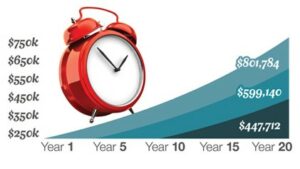Notes from Your Bettendorf Financial Group Team
Staying positive these days is a lot easier said than done.
Inflation is running hot, gasoline prices are up, interest rates are climbing, and it’s hard to remember the last time the stock market had a winning week. Add in Russia’s aggression toward Ukraine, and there are plenty of reasons to be discouraged.
One approach that may help is separating issues into what you can and can’t control. With investing, for example, you can control your short-term goal and your long-term target.
Short-term goals like saving for a summer vacation or large household expenses should still be on track despite the rocky start to 2022. Long-term goals benefit from the power of time and may still be within reach on your initial schedule.
If you’re feeling uneasy about maintaining your short-term goals or your long-term targets, please reach out. We’d welcome the chance to give you some positive news.
Time to Review
The new year is a great time to reflect, revisit priorities, and take actions — big and small — to help you stay on track to reach your financial goals. Here are five smart actions to consider.
1. Review your financial goals and notify your advisor of changes
Perhaps you’ve decided to buy or renovate a home, pay for a grandchild’s college education or adjust your retirement date.
2. Review your investment portfolio with your financial advisor
With near-record stock valuations in 2021, your investment portfolio may have evolved to a different risk profile. Depending on your goals, this may mean you have too many stocks and too few bonds (or vice versa).
3. Confirm your beneficiary designations
A beneficiary is a person or entity, such as a trust or nonprofit, that you have designated to receive the assets in your financial accounts when you die. The named beneficiaries override the will you may have set up. All financial accounts (regardless of size) should have beneficiaries named — and updated over time, as needed. Major life changes such as a birth, divorce or marriage are also good times to review your beneficiaries.
4. Evaluate your cash reserve
When a financial emergency arises, a cash reserve can help you pay for it and stay on track with your financial goals. Strive to keep three to six months of living expenses in a safe, liquid cash account. A savings account, money market deposit account or short-term certificate of deposit are good options to consider.
Because your cash reserve is the first line of protection against a financial setback, consider reviewing it annually to make sure that it fits your current needs. If you used some of your cash reserves recently or your circumstances have changed — higher expenses with a new child or a new job, for example — it’s worthwhile to replenish it.
5. Jump-start organizing your tax records
It’s important to maintain quality records to support your income and expenses each tax season. As the April 18 deadline for filing 2021 federal tax returns draws closer (April 19 for residents in Maine and Massachusetts), you begin receiving tax documents from employers and other institutions. Whether you file yourself or work with a tax professional, consider organizing this material earlier in the season to help minimize stress and stay on track for the tax day deadline.
Feel More Confident About The Year Ahead

Medicare: 3 things to consider before 65
Choosing your retirement health care coverage is an important decision — but it can feel complicated. As you learn about the Medicare enrollment process, here are three things to keep in mind about the federal health insurance program:
1. Medicare doesn’t cover all healthcare costs
Medicare is a valuable program for many retirees, but it wasn’t designed to cover health
care expenses in full. While doctor visits and routine medical and emergency services are
covered, Medicare doesn’t cover vision, hearing or dental — and there is limited
coverage for nursing home and other long-term care options. In some cases, premiums
and copays for covered services may become significant.
Here are the four parts of Medicare and what they cover:
- Part A: Inpatient care in a hospital or skilled nursing facility.
- Part B: Doctor visits, routine medical services (e.g., flu shots), and emergency medical services.
- Part C, or Medicare Advantage:
- Part D: Prescription drug coverage. Private insurance companies administer these
plans, which you can purchase in tandem with Medicare Parts A and B.- Private insurance companies provide Medicare Advantage — the equivalent of Parts A and B coverage, combined — often along with some preventive services, vision and dental coverage.
- An alternative is traditional Medicare with supplement insurance called Medigap. A Medigap policy helps pay some of the health care costs that Medicare Parts A and B don’t cover, such as copayments and deductibles.
- Part D: Prescription drug coverage. Private insurance companies administer these plans, which you can purchase in tandem with Medicare Parts A and B.
2. Missing the initial Medicare enrollment window may result in penalties

Most individuals become eligible for Medicare at age 65. There is a seven-month window for initial enrollment, which begins three months before the month of your 65th birthday and runs through three months after your birthday month.
If you don’t enroll during this initial period, you may face penalties for late enrollment. The Medicare program doesn’t send reminders.
If you are still working at age 65 and have employer-sponsored insurance, you may be able to enroll late in Medicare without penalty. Review the details of your situation carefully, and keep in mind that COBRA coverage does not exempt you from the penalty.
3. Your income prior to enrollment will affect how much you pay
Your income is a primary factor in how much you will pay for Medicare premiums. In general, the higher your income two years prior to enrollment, the more you will pay for Medicare premiums. Your premiums will also be higher if you haven’t paid into the Medicare system for a designated period of time.
In the years before retirement, it’s important to be aware of how your income could impact your Medicare prices. If you’re near the threshold, your advisor can help identify strategies to reduce your modified adjusted gross income.
If you currently have Medicare coverage and your income goes down because of a life-changing event — marriage, divorce or death of a spouse, for example — you can contact the Social Security Administration to request a reduction of your Medicare premium.
Women and Financial Strategies
Forty-four percent of American women are the primary breadwinner in their house. Yet only 10% of women feel very confident in their ability to fully retire with a comfortable lifestyle.
Although more women are providing for their families when it comes to preparing for retirement, they may be leaving their future to chance.
Women and College
The reason behind this disparity doesn’t seem to be a lack of education or independence. Today, women are more likely to go to college and graduate than men. So what keeps them from taking charge of their long-term financial picture?
One reason may be a lack of confidence. In one recent study, less than half of the more than 2,000 women surveyed said they felt satisfied with their knowledge of finances. Women may shy away from discussing money because they don’t want to appear uneducated or naive and hesitate to ask questions as a result.
Insider language
Since Wall Street traditionally has been a male-dominated field, women whose expertise lies in other areas may feel uneasy amidst complex calculations and long-term financial projections. Just the jargon of personal finance can be intimidating: 401(k), 403(b), fixed, variable. 5 To someone inexperienced in the field of personal finance, it may seem like an entirely different language.
But women need to keep one eye looking toward retirement since they may live longer and could potentially face higher health-care expenses than men.
If you have left your long-term financial strategy to chance, now is the time to pick up the reins and retake control. Consider talking with a financial professional about your goals and ambitions for retirement. Don’t be afraid to ask for clarification if the conversation turns to something unfamiliar. No one was born knowing the ins-and-outs of compound interest, but it’s important to understand in order to make informed decisions.
Compound Interest: What’s the Hype?
Compound interest may be one of the greatest secrets of smart investing. And time is the key to making the most of it. If you invested $250,000 in an account earning 6%, at the end of 20 years your account would be worth $801,784. However, if you waited 10 years, then started your investment program, you would end up with only $447,712.

This is a hypothetical example used for illustrative purposes only. It does not represent any
specific investment or combination of investments.
- CNBC.com, January 19, 2017
- TransAmericaCenter.org, 2017
- The Atlantic, August 8, 2017
- Time.com, February 12, 2018
- Distributions from 401(k), 403(b), and most other employer-sponsored retirement plans are taxed as ordinary income and, if taken before age 59½, may be subject to a 10% federal income tax penalty. Generally, once you reach age 70½. You must begin taking required minimum distributions.
The content is developed from sources believed to be providing accurate information. The information in this material is not intended as tax or legal advice. It may not be used for the purpose of avoiding any federal tax penalties. Please consult legal or tax professionals for specific information regarding your individual situation. This material was developed and produced by FMG Suite to provide information on a topic that may be of interest. FMG Suite is not affiliated with the named broker-dealer, state- or SEC-registered investment advisory firm. The opinions expressed and material provided are for general information, and should not be considered a solicitation for the purchase or sale of any security. Copyright FMG Suite.
Consumer Confidence at the Pump
The latest Consumer Price Index (CPI) report was recently released and confirmed what economists anticipated: consumer inflation has risen 7.9% over the past year, the largest spike since 1982— none of which is a surprise for anyone who has visited a gas station lately.
With the price of gasoline trending higher, it may be tempting to attribute these prices to the global economic disruptions caused by Russia’s aggression toward Ukraine. However, the latest CPI reflected the 12 months ended in February and didn’t include most of the oil and gas price increases that followed Russia’s invasion of Ukraine on Feb. 24.
There is a slight silver lining within the CPI, however. The food away from home index, which tracks restaurant purchases, rose 0.4 percent in February after increasing 0.7 percent in January. This could indicate strengthening consumer confidence despite inflation, as consumers continue to eat out.
What does this all mean for consumers? It’s hard to say, but some predict further inflationary pressures, while others wait and see what the Fed says at its meeting this week.
If you have any questions or concerns regarding recent events and your portfolio, let us know. We’re always ready to help.
The content is developed from sources believed to be providing accurate information. The information in this material is not intended as tax or legal advice. It may not be used for the purpose of avoiding any federal tax penalties. Please consult legal or tax professionals for specific information regarding your individual situation. This material was developed and produced by FMG Suite to provide information on a topic that may be of interest. FMG Suite is not affiliated with the named broker-dealer, state- or SEC-registered investment advisory firm. The opinions expressed and material provided are for general information, and should not be considered a solicitation for the purchase or sale of any security. Copyright FMG Suite.
